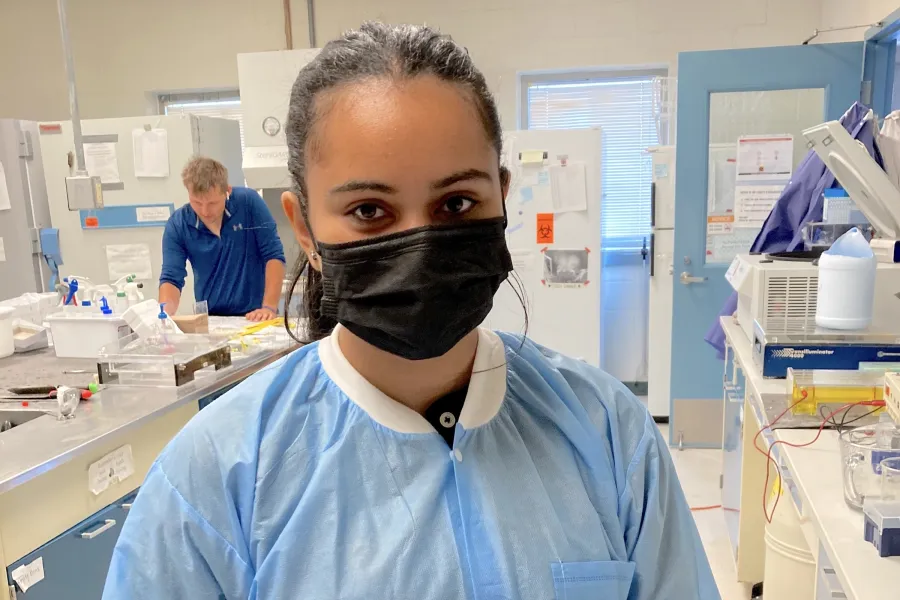Miriam Schlessinger, an undergraduate at Southern Illinois University Edwardsville, recently participated in the Summer Research Opportunities Program (SROP), a 10-week hands-on summer internship at PRI that aims to enable undergraduate students from underrepresented populations to explore careers in applied science.
Miriam worked with Dr. Nohra Mateus-Pinilla, Lab Director and Principal Investigator, and Evan London, bioinformatics specialist and student supervisor in the Wildlife Veterinary Epidemiology Lab at the Illinois Natural History Survey (INHS) on applied genomic sequencing techniques to better understand the factors influencing the vulnerability of wild white-tailed deer to chronic wasting disease (CWD) in deer.
“Miriam is curious, inquisitive, positive, and hardworking. In addition to her project and thanks to her work ethic and collaborative attitude, she participated in other research efforts related to deer and geese," said Mateus-Pinilla.
Over 10 weeks, Miriam studied samples from over 1,000 individual deer gaining experience in laboratory safety, gross dissection and handling of deer tissue at Biosafety Level 1 and 2 lab, DNA extraction, DNA quantification, and polymerase chain reaction, or PCR, a very precise laboratory technique used to make multiple copies of a specific segment of DNA.
“It was a pleasure to work alongside Miriam and mentor her while she acquired skills in molecular lab work and genetics. She brought curiosity and passion to a new field and achieved success in a remarkably short timeframe. Miriam demonstrated commitment and capability in the lab, and we hope to continue our research collaborations with her beyond the summer research opportunities program,” said Evan London
Part of Miriam's work focused on analyzing haplotype frequencies of the prion gene in southern Illinois white-tailed deer. This information will help inform CWD management in wild deer populations and illuminate how genetic variability affects prion disease.
"In this short amount of time, Miriam has become a trusted and supportive member of the team, we will miss her. It was a pleasure to have her working with us, she leaves many doors open," said Mateus-Pinilla.
Miriam recently answered some questions about her internship experience:
Describe, briefly, what you are doing during your Summer Research Opportunity Program (SROP) internship?
During my SROP internship, I am getting experience not only working in a lab, and conducting my own research, but also the ins and outs of being a graduate student.
What are you learning during the internship? Has anything surprised you or shifted your thinking?
I have learned so much during this internship. I have learned how to do DNA extraction, PCR, process tissue samples, use computer software to analyze DNA sequences, as well as collect samples from the field.
What sparked your interest in population genomics and/or chronic wasting disease?
I have always loved science, especially wildlife biology. Over the years with outbreaks of ebola, H1N1, and COVID-19 I have become fascinated with infectious diseases. Chronic wasting disease research sits at the intersection of both of these fields. Also, the fact that chronic wasting disease is caused by a protein offers such an enigma, that I couldn’t help but be intrigued from the moment I first heard of it.
How do you think your internship might affect your studies or your career path?
I think this internship will and already has affected my academic career in so many positive ways. I have made great connections with people in the field of infectious disease as well as in related fields of ecology and wildlife biology. This experience has allowed me to feel like a real scientific researcher and that has given me even more motivation to continue my journey in academia.
What was the best part of your SROP internship experience?
The best part of this whole experience has been learning new skills and all the friends I have made along the way.
This article originally appeared on People of PRI, a publication of the Prairie Research Institute at the University of Illinois Urbana-Champaign.
